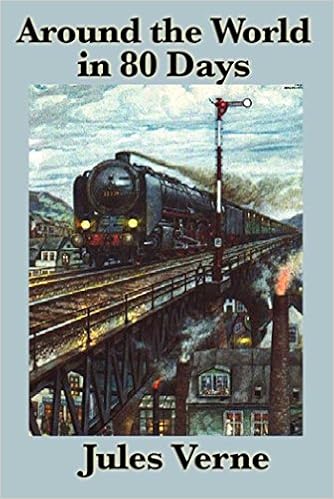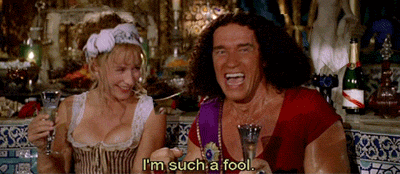So, three and a half years after undertaking this program, I finally come to the first book on the IWE list that was written in French, which is the most heavily represented foreign language literature on it by a decent margin. This particular book ironically is very little concerned with anything to do with France, featuring mainly British characters moving through English-speaking countries and territories under the aegis of the British Empire. The only nominally French character is the protagonist Phileas Fogg's manservant Passepartout, who acts more like an American in a popular magazine story of the period than a literary Frenchman. All this aside, I found the book to be good fun, and a respite--which I seem to be needing more and more of lately--not from more serious works, which works themselves I generally like, but from the weight of not really being able either to intelligently commiserate about them with other people, and of the questions and accusations which they tend to pose about my own life and engagement with, or as it were disengagement from, the active and interesting sectors of the world, which cannot help but be a little discomfiting at times.
Many stills from the 1956 film show Fogg in a balloon, though in the book he did not undertake any part of the journey in one.
Given all of the anguish that so many would be authors and other storytellers across time have had in trying to think up any kind of plot, the simplicity of the concept here, the structure of which practically comes ready-made, and the ease with which the author can dive right into it, would be humorous if it were not depressing to think about all of the inept plot-seekers. And for all the simplicity and general predictability of the story, many of the various twists and difficulties added to fill out/adorn it I thought were either quite interesting or ingenious, including that at the end, which, being unfamiliar with the story beforehand and not taking things like the rotation of the earth into account like a genuinely clever person would have, I had not anticipated, assuming a more strained and implausibly heroic finish. I was very satisfied with this aspect of the book. I was also quite taken by the part where Fogg purchases the ship carrying him across the Atlantic when it is running low on coal and proceeds to chop up and burn the top half of it--masts, deck, etc--mid-ocean for fuel. The whole tone is high-spirited and occasionally humorous, albeit in what I guess is a specifically Eurocentric way that at this point can only appeal to dinosaurs like me. The book is not so racist that it is any more impossible to read than most famous 19th century novels that brush up in any way with the non-European world. The offense, if there is any, would mainly be that the various non-European peoples that appear are one-dimensional and serve mainly as background. They collide at times with the European mainstream of the book but do not for the most mesh with it, nor is any attempt made to do so. Having Fogg marry the Indian lady he rescued from suttee, a peculiarly alien horror which made a strong impression on the European imagination when it first was made known there, as it makes an appearance in almost every story of the period with an Indian connection, was I thought a nice French touch, the intelligentsia of that nation being in this era more fascinated by and open to the idea of mixed-race marriage than the English-speaking peoples were, or at least would have been comfortable promoting publicly. The character of Mrs Aouda is not especially distinct however.
p.87 Sailing past Grand Andaman Island near Burma: "The savage inhabitants of the island were nowhere to be seen. They stand at the very bottom of the human scale, but it is wrong to call them cannibals." No doubt the accounts of these people brought back to Europe lacked a proper understanding of their culture. An honest mistake. Of course I know nothing about them, either, but I would know to approach any analysis of them much more sensitively.
p. 172 With the last few books, I haven't begun to mark any passages for the postings until I have been well into them. I have a lot from the American section of the trip, because I find them humorous and interesting in their impressions of our (perhaps) more vigorous forbears in this country. Regarding a railroad bridge that appeared to be well on the way to collapsing: "Several cables had given way and it was impossible to risk going across it...Besides, given the generally carefree attitudes of the Americans, you can be sure that when they start getting cautious, then there really is cause for concern." Needless to say, they went across the bridge.
pp. 177-8 Exchange with a typical western American on the train. Riotous. "And for a moment it looked as if he was going to grab the card that had been played, adding, 'You haven't a clue about this game.' 'Perhaps I'll be better at another sort of game,' said Phileas Fogg, getting to his feet. 'It's just up to you if you want to try, you bloody Englishman,' the vulgar character replied." I wonder what it says in the original though. An American of this time, or any time, probably would not have said "bloody".
p. 179 More. "'It's the next station. The train will be there in an hour's time. It stops for ten minutes. Ten minutes is enough time to exchange a few shots with a revolver.' 'Fine,' replied Mr Fogg. 'I'll get off at Plum Creek.' 'And I reckon you won't be getting back on again!' added the American, with breath-taking insolence."
p. 180 As the train was running behind schedule it did not stop for ten minutes at Plum Creek. However the conductor suggested that the combatants could hold the duel in an empty car in the rear of the train, leading Passepartout to observe that "Well, this really is America for you...and this train conductor is a real gentleman."
The image of America as a country full of gun toting maniacs goes back a long way. Passepartout purchased a small arsenal of firearms for the train ride anticipating they might be necessary, and when the band of Sioux attack the train in Nebraska all of the passengers are of course armed and give every appearance of loving the ensuing action.
pp. 209-10 More humorous American stuff: "'Burn my ship!' exclaimed Captain Speedy, who had difficulty getting the words out of his mouth anymore. 'A ship worth $50,000.' 'Here's $60,000,' replied Phileas Fogg, handing the captain a wad of banknotes. The effect on Andrew Speedy was spectacular. No true American can fail to be moved by the sight of $60,000."
I am not always sure how I will like these kinds of books that are famous but used to be mainly recommended for adolescents--some of them read poorly now--but I do like this one. Verne is an intelligent enough writer to be worthwhile for somebody at my level at least to engage with.
Since most of the older editions of the book I could find were aimed for the child market, and it does not seem to have been included in the old Modern Library or any other of the sets I collect, I got a brand new Penguin version. Perhaps because the book is not deadly serious or the source of contention among intellectuals or rival cultural communities I could stand the editing and the notes more than is often the case with me with modern editions of classic books. I probably could have read this in the original easily enough, though I might have had some difficulty with the technical vocabulary of ships and trains. However, I never got to read well enough even in English to get what I would have wanted out of reading in the original, and as with so many of the goals of youth, once youth is past and the opportunity to win such status and rewards as are best enjoyed in that period of life is largely lost, the motivation for continuing to pursue such goals dissipates.
I did learn from the notes that the Irish city of Cork was called "Queenstown" by the British during the period when they were the ruling power in that country. I mention this because I had never seen this, or at least noticed it before, and I have even been to this city, where any reference to this former name apparently has been thoroughly erased. Since it is the kind of thing I usually know to the point of boredom, I found I was actually excited to discover a new fact in this line, much as I was several years back to learn that Rhodes and several other Greek Islands had been Italian possessions from 1912 to 1943.
The Challenge
In contrast to the last Challenge, this one produced a collection of authors with decidedly unexotic names.
1. Daniel James Brown--The Boys in the Boat............................................................19,739
This book, about a group of American rowers in the 1936 Olympics, was apparently a best seller. That is a whopping point total in the annals of this game.
2. Jane Austen--Persuasion...........................................................................................1,616
Books already on the IWE list are ineligible for the Challenge, but Persuasion, which I have the impression was somewhat overlooked at the time the list was made in the 1960s, did not make it, and hence is able to compete here.
3. Around the World in Eighty Days (movie--2004)........................................................302
Another surprise here that the more famous 1956 Oscar-winning version of the story does not appear as a qualifier for the game, but this curious remake starring Jackie Chan shows up instead.
4. Wally Lamb--I'll Take You There..................................................................................106
5. Tom Zoellner--Train........................................................................................................81
6. Jeff Smith--Mr Smith Goes to Prison..............................................................................79
7. Kate Kelly--The Secret Club That Runs the World.........................................................56
8. Rebecca Ryman--Olivia and Jai......................................................................................45
9. Philip Jose Farmer--The Other Log of Phileas Fogg.......................................................27
10. Joseph F. Nelson--So You Want to Build a Steam Locomotive......................................14
11. I Love Toy Trains: The Mighty Steamers (video)...........................................................10
12. Coomaraswamy and Nivedita--Myths of the Hindus and Buddhists................................3
13. Mabel Potter Daggett--Women Wanted............................................................................0
14. Barrie Penrose--Stalin's Gold............................................................................................0
15. Richard Dean--How to Set Up a Family Budget...............................................................0
Round of 15
With only fifteen works qualifying for this Challenge, Daniel James Brown gets a bye straight to the Elite Eight.
#2 Austen over #15 Dean
I think Dean may not be a legitimate book. I don't think he would have won anyway.
#14 Penrose over #3 Around the World in Eighty Days
Penrose is in the State Library database, though there do not seem to be any copies of his book in circulation. That is enough to beat the 2004 film, which evidently flopped on its initial release. I had never heard of it.
#4 Lamb over #13 Potter-Daggett
The State Library actually has a copy of Potter-Daggett's collection of World War I letters. If I want to check it out this is the year to do so, as the book's publication date is 1918 and books cease to circulate from this library once they are a hundred years old. However the popular Lamb's latest offering is 130 pages shorter, a significant enough difference for him to carry home the prize.
#5 Zoellner over #12 Coomaraswamy/Nivedita
These books were pretty evenly matched. The Zoellner book is more conveniently available as well as, I am somewhat embarrassed to admit, having a more appealing subject, as it is looks to be a travel book (the authors rides on a variety of famous railroads).
#6 Smith over #11 I Love Toy Trains
#7 Kelly over #10 Nelson
It isn't available in any event, but I have to be honest, I don't really want to build a steam locomotive.
#9 Farmer over #8 Ryman
Farmer is much shorter. I've never heard of Ryman, whose 1990 book clocks in at 644 pages.
Round of 8
#14 Penrose over #1 Brown
Books that are shorter by 100+ pages have huge built-in advantages under my system before the Final Four. Brown was doomed.
#2 Austen over #9 Farmer
#4 Lamb over #7 Kelly
These two were almost perfectly matched as far as length, year of publication, etc. Lamb gets the nod for availability.
#5 Zoellner over #6 Smith
Smith was slightly shorter, but I don't exactly feel like reading an elite-educated white collar criminal's account of his time in prison.
Final Four
#2 Austen over #14 Penrose
#4 Lamb over #5 Zoellner
The availability factor, as well as some curiosity about Lamb, who has managed to carve out something of a commercial career while remaining at least upon the fringes of the true literati.
Championship
#2 Austen over #4 Lamb
Not a cop-out. I have never read Persuasion, I have a copy of it at home, and it comes in at anywhere between 180-230 pages. It's a no-brainer, really.


.jpg)



No comments:
Post a Comment